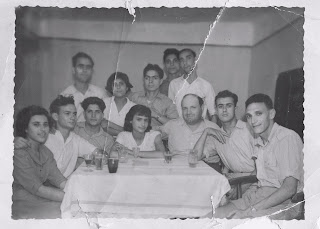My Father's War
By Daniel Bouskila

Nessim Bouskila, right, and his comrades in the Israel Defense Forces in 1948. Photo courtesy Daniel Bouskila.
It was Friday afternoon, May 14, 1948. Twenty Four-year-old Nessim Bouskila, a recent immigrant from Marrakech, was riding the Paris metro. Across the way sat a man reading a special afternoon edition of "France Soir." Nessim read the newspaper's headline: "L'etat d'Israel est ne" -- "The State of Israel is Born." Amazed and overjoyed, Nessim rushed off the metro at the next stop, hurrying to the nearest newsstand to buy the paper. Reading past the headline, Nessim's joy turned to anxiety as he learned of the Arab threat to invade the newly born Jewish state. He also read the Jewish Agency's plea calling on young Jews to come to Israel's defense.
"This is what we grew up praying for and dreaming of," my father told me in a recent conversation, "so I did not need to read any further." Nessim made his way to the headquarters of the Jewish Agency in Paris, where he found more than 400 young men and women already lined up, eagerly awaiting the "privilege," as Papa worded it, to help defend Israel.
Raised in Marrakech, Nessim's Jewish education was the same as that of his ancestors, with one major exception: Nessim also studied Bialik and Tchernichowsky.
"Our rabbis in Morocco never once condemned secular Zionism!" he exclaimed.
After initial medical exams in Paris, Nessim was sent to the Jewish Agency's "Arenas Camp" in Marseille, where, for one month, he and hundreds of others were given paramilitary training by members of the newly founded Israel Defense Forces. At 4 a.m. one day, they finally boarded a rickety boat at the port of Marseille.
The journey to Israel took longer than expected. The first truce had been declared, and the United Nations delayed the ship, questioning the necessity of Israel bringing in boatloads of young volunteers. For 12 tortuous days at sea, Nessim and the others barely saw daylight, living on sardines, crackers, jam and water.
The ship docked in Haifa, and the volunteers were detained for four days by the United Nations. "
We had no idea where we were," Papa told me. "These first days were hardly the Israel we dreamt of."
It was 1 a.m., and the confused new arrivals were awakened and hurried off to Beit Lid.
"This was the military induction center," Papa recalled. "We were photographed, given ID cards and uniforms."
The new recruits were then taken to Tel Mond, where they spent the next month in boot camp. One of the few already fluent in Hebrew, Nessim and two of his childhood friends were eventually separated from their French-speaking comrades. They were assigned to a Palmach Battalion in the Yiftach Brigade, where they received advanced training. In October 1948, Nessim and his friends participated in the famous Operation Yoav in the Negev, commanded by Yigal Allon. They saw heavy combat action, and Nessim returned from the battlefield having lost his two childhood friends.
"I now understood the heavy price of independence," he recounted, somewhat choked up.
I asked Papa if he had any contact with his parents back in Morocco: "I received a letter from them in our native Judeo-Arabic, transliterated into Hebrew characters."
This confused the military censor, who called Nessim in and had him swear over a Bible that the letter was not some secret code from Arab spies.
"The censor was Polish," Papa said with a smile.
An unexpected illness weakened Nessim, and he was transferred from the Palmach to the air force, where he was assigned the task of securing high-ranking officers and pilots. This job gave him a front-row seat to Israel's political scene. He accompanied officers to the Knesset in Tel Aviv, where he heard David Ben-Gurion address the parliament; the Hatikvah neighborhood, where he heard Menachem Begin speak in a public rally; and the Hadar Hotel, where he saw U.N. mediator Ralph Bunche. An assignment to Armon Ha-Natsiv in Talpiot gave Nessim his first trip to Jerusalem, where he caught his first glimpse -- albeit from a distance -- of Jerusalem's Old City.
In 1949, Nessim spent the first Passover of modern-day Israel in Jerusalem. He stayed with his mother's cousin, who had lived in Jerusalem's Old City until she was forced out just a few months earlier.
"I finally said 'This year in Jerusalem,'" he recalled with great emotion.
On his first flight out of Israel, Nessim sat on the same plane as Moshe Sharett, Israel's first foreign minister. Symbolic, perhaps, because growing up in Los Angeles, I saw my father as my own personal Israeli foreign diplomat.
Asked how he sees Israel today, he said "I am proud to see a strong and beautifully developed country whose brightest days are still ahead of her."
Papa couldn't resist sharing how proud he is that his granddaughter Shira was invited by the Israeli Consulate to sing "Hatikvah" at Los Angeles' recent "Live for Sderot" event. Sixty years later, this was Papa's ultimate personal reward for his service to Israel.